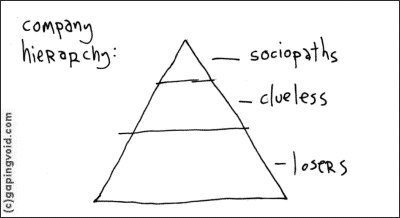As the saying goes, there are three big decisions to make in life: what to do, where to do it, and who to do it with. The “what to do” part, for most people, is equivalent to your career, and obviously your career has a big influence on your finances for a variety of reasons.
Which brings us to Amazon. There’s a fascinating cover story in the current Businessweek on Jeff Bezos. Check out this passage about his style:
His drive and boldness trumps other leadership ideals, such as consensus building and promoting civility. While he can be charming and capable of great humor in public, in private he explodes into what some of his underlings call nutters. A colleague failing to meet Bezos’s exacting standards will set off a nutter. If an employee does not have the right answers or tries to bluff, or takes credit for someone else’s work, or exhibits a whiff of internal politics, uncertainty, or frailty in the heat of battle—a blood vessel in Bezos’s forehead bulges and his filter falls away. He’s capable of hyperbole and harshness in these moments and over the years has delivered some devastating rebukes. Among his greatest hits, collected and relayed by Amazon veterans:
“Are you lazy or just incompetent?”
“I’m sorry, did I take my stupid pills today?”
“Do I need to go down and get the certificate that says I’m CEO of the company to get you to stop challenging me on this?”
“Are you trying to take credit for something you had nothing to do with?”
“If I hear that idea again, I’m gonna have to kill myself.”
“We need to apply some human intelligence to this problem.”
[After reviewing the annual plan from the supply chain team] “I guess supply chain isn’t doing anything interesting next year.”
[After reading a start-of-meeting memo] “This document was clearly written by the B team. Can someone get me the A team document? I don’t want to waste my time with the B team document.”
[After an engineer’s presentation] “Why are you wasting my life?”
You may wonder: what prompts him to behave like this?
Some Amazon employees advance the theory that Bezos, like Jobs, Gates, and Oracle(ORCL) co-founder Larry Ellison, lacks empathy. As a result, he treats workers as expendable resources without taking into account their contributions. That in turn allows him to coldly allocate capital and manpower and make hyperrational business decisions, where another executive might let emotion and personal relationships figure into the equation. They also acknowledge that Bezos is primarily consumed with improving the company’s performance and customer service and that personnel issues are secondary.
Not surprisingly, Amazon doesn’t do so great on employee retention:

Obviously it’s not entirely fair to compare Amazon to a company like IBM or HP that’s been around for a while and will therefore have a higher median tenure, but… one year? I suppose that’s better than the median employee tenure at Burger King, but that level of employee turnover would indicate that either HR is doing a terrible job of bringing in the right people, or that Amazon is doing a terrible job of retaining people once they’re hired.
Cartoonist Hugh McLeod created the following cartoon to explain how corporate hierarchies work:

In a wonderful post, blogger Venkatesh Rao elaborates on McLeod’s idea. Tying it back to William Whyte’s classic book The Organization Man, he writes:
Back then, Whyte was extremely pessimistic. He saw signs that in the struggle for dominance between the Sociopaths (whom he admired as the ones actually making the organization effective despite itself) and the middle-management Organization Man, the latter was winning. He was wrong, but not in the way you’d think. The Sociopaths defeated the Organization Men and turned them into The Clueless not by reforming the organization, but by creating a meta-culture of Darwinism in the economy: one based on job-hopping, mergers, acquisitions, layoffs, cataclysmic reorganizations, outsourcing, unforgiving start-up ecosystems, and brutal corporate raiding. In this terrifying meta-world of the Titans, the Organization Man became the Clueless Man. Today, any time an organization grows too brittle, bureaucratic and disconnected from reality, it is simply killed, torn apart and cannibalized, rather than reformed. The result is the modern creative-destructive life cycle of the firm, which I’ll call the MacLeod Life Cycle.
A Sociopath with an idea recruits just enough Losers to kick off the cycle. As it grows it requires a Clueless layer to turn it into a controlled reaction rather than a runaway explosion. Eventually, as value hits diminishing returns, both the Sociopaths and Losers make their exits, and the Clueless start to dominate. Finally, the hollow brittle shell collapses on itself and anything of value is recycled by the sociopaths according to meta-firm logic.
There’s much more to the post–I highly recommend it. It illuminates how modern companies function and goes a long way toward explaining the success of and adulation for the likes of Bezos.
Just read that article yesterday! I thought it was great and wish there was more to read.
So true. But why is Bezos singled out? Plenty of sociopaths running big business. Perhaps ground zero is WS and Washington DC. But the biggest bunch of blowhards are in the Pentagon prancing around as our “finest”, when in reality, they are our lamest.
I singled out Bezos because I just read the BW article and it had some great quotes. But yeah, plenty of sociopaths to go around…